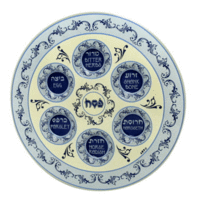 The story of Passover is one of the world’s oldest and most influential accounts of liberation, the transit of a nation “from ignominy to celebration,” in the words of the Mishnah, “from servitude to freedom, from mourning to holiday, and from gloom to great light,” in the words of the Seder’s Haggadah.
The story of Passover is one of the world’s oldest and most influential accounts of liberation, the transit of a nation “from ignominy to celebration,” in the words of the Mishnah, “from servitude to freedom, from mourning to holiday, and from gloom to great light,” in the words of the Seder’s Haggadah.
Freedom enables spontaneity, creativity, flexibility. At the same time, the freedom we attain in the Passover story is a liberation from subjection to tyrannical whimsy, an escape from the clutches of autocratic impetuousness. The liberty we gain in the story of the Exodus from Egypt really is the freedom to work together at constituting and maintaining a just society.
Pharaoh, after all, is one paradigm of unchecked freedom. “Throw every male Hebrew child into the river,” decrees the king. “Who is the ‘Eternal One’ that I should obey him and let Israel go?” he asks Moses and Aaron imperiously, and “I do not know the Eternal One, I will not let Israel go,” he decides. In the minds of a populace that adulates and elevates such a ruler, his unbridled power perhaps may substitute for the true liberty of a land and the responsibility that comes with freedom.
As with the Angel of Death – “who slew the butcher that slaughtered the ox who drank the water that quenched the fire that burned the rope that beat the dog who ate the cat,” and so forth – the Angel of Death who, in turn, is done away with by the Blessed Holy One, in the playful but deadly serious song that concludes the festive Seder night at many family tables, the tyrant, like Pharaoh in the Exodus account, inevitably learns that all temporal power is limited and fleeting. What remains, then, by way of governance among us, when all pretensions of absolute liberty to impose one’s own will on everybody else are gone? The answer is the ever-ongoing search for right ways, and the never-ending effort to heed a numinous call toward love and justice.
In the mystical Zohar, compiled in the Middle Ages, the Talmudic Rabbi Hiyya is said to have taught: “Thirty days before a nation rises to power or is overtaken by calamity on earth, the event is proclaimed in the world. Sometimes it is transmitted through the mouths of children, sometimes through people who have no sense, and sometimes the word is transmitted through the mouths of birds, who announce it in the world, yet no one notices.” And “When the nation is virtuous,” the teaching continues, “then that word is transmitted to righteous leaders of the community, so that it may be revealed to the people, and they can return, in a mending of ways, to the Eternal One.” (Zohar, Shemot II:6b)
That teaching may smack of augury and omens – but equally it seems to speak of a tremulous and urgent sense of disquiet that spreads before the self-assertion of a mighty earthly power or its demise. If the constituents of the power are worthy, the teaching suggests, they will recognize an opportunity to shape their might with mindfulness before it bursts forth upon the world, or before their power is utterly undone.
Untempered force is destructive in our lives, just as absolute decrees that we express without humility are brittle. Responsiveness is every bit as essential as authority in building a society. Without regulation, existence becomes chaotic and unhinged; just as it does if governed by unchecked tyranny. Law and love must find an equilibrium together. Liberty and structure constantly must work at enabling one another and discovering a balance.
So, in narrating our Passover story, we celebrate our escape from tyranny to freedom; and, in so doing, we tell the story of how we became a people of Torah – a society that seeks to govern itself with care and in love.
